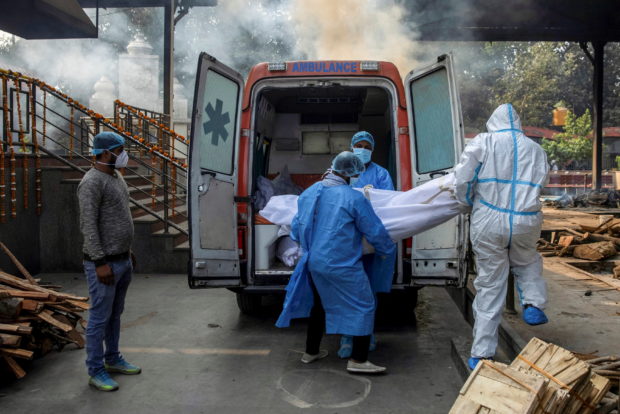
FILE PHOTO: Health workers and a relative carry the body of a man, who died due to COVID-19, from an ambulance to a crematorium in New Delhi, India, November 13, 2020. REUTERS/Danish Siddiqui
NEW DELHI — India has detected a new “double mutant variant” of the novel coronavirus or SARS-CoV-2, the health ministry said Wednesday, adding to concern as the government struggles with the highest single-day tally of new infections and deaths this year.
Genome sequencing and analysis of samples from Maharashtra state found mutations in the virus that do not match previously catalogued “variants of concern” (VOC), the ministry said in a statement.
Maharashtra is one of India’s worst-affected states but the ministry said it was not clear if the new variant was causing an upsurge there or in other states.
“Though VOCs and a new double mutant variant have been found in India, these have not been detected in numbers sufficient to either establish a direct relationship or explain the rapid increase in cases in some states,” the ministry said in a statement.
It did not elaborate.
India has already reported several cases of a variant first detected in Britain, as well as ones first found in South Africa and Brazil.
On Wednesday, India reported 47,262 new infections over the previous 24-hour period, the highest since early November, taking its overall tally to 11.7 million. Only the United States and Brazil have higher caseloads.
The number of deaths from COVID-19 in India in the previous 24 hours rose to 275, the most this year, taking the total to 160,441, government data showed.
Several states announced a ban on large gatherings ahead of the Hindu festival of Holi this weekend.
The health ministry said states were “strongly advised” to restrict public observation of festivals.
“Any laxity at this point in ensuring strict adherence … to contain the spread of COVID-19, may result in losing the impetus and benefits that our country has gained so far in managing the virus,” the ministry said in a statement.
Alarmed by the surge, the federal government has announced it was expanding its nationwide inoculation campaign to include everyone above the age of 45 years and appealed to people to get vaccinated.
Total vaccinations in India, ranked as the world’s third-highest, behind the United States and China, but its ranking is lower on a per capita basis, the website Our World in Data showed.

